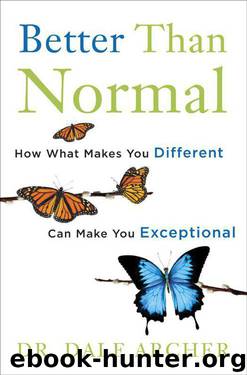Better Than Normal: How What Makes You Different Can Make You Exceptional by Dr. Dale Archer

Author:Dr. Dale Archer [Archer, Dale]
Language: eng
Format: epub
Tags: Psychology, Personality, Clinical Psychology, Mental Health
ISBN: 9780307887474
Publisher: Random House Digital, Inc.
Published: 2012-03-13T07:30:09+00:00
REDEFINING HISTRIONIC PERSONALITY DISORDER (HPD)
Histrionic personality disorder is described in the DSM-IV as “a pervasive pattern of excessive emotionality and attention seeking.”
We can see some of these “symptoms” a little bit in Leora’s story. Crying in the dining hall could be seen as “excessive emotionality and attention seeking.” Leora certainly felt like it was excessive—that’s what made it so embarrassing for her.
But to understand the full reach of this personality disorder, I’d like to turn to the diarist, novelist, and short-story writer Anaïs Nin. She was posthumously “diagnosed” with HPD by the psychologist Angie A. Kehagia, whose careful examination of Nin’s biography determined that Nin was almost certainly histrionic. Although posthumous diagnosis is often problematic, in this case I think Kehagia’s conclusions are extremely convincing.
The gap between Leora’s public tears and Anaïs Nin’s emotionally destructive behavior is enormous. I want to clarify here that the behavior of most dramatic people is nowhere near that of Nin, whose stormy life included many extramarital affairs, a marriage with a bigamist, a constant need for attention in every aspect of her life, and incest with her father when she was an adult. She was certainly a ten-plus on the continuum.
Nin, like many people with HPD, came from an unstable family background. Like other personality disorders, HPD is generally thought to be more heavily influenced by “nurture” than by “nature.” Nin’s father was a moody composer and pianist who had many extramarital affairs, and physically and emotionally abused the children. He abandoned the family when Anaïs was eleven. (Leora’s healthy family life may be one reason why she has always stayed on the positive side of the continuum.)
By the time she was an adult, Nin showed every one of the diagnostic symptoms of HPD. By looking at Nin’s life, it’s easy to see how these behaviors can become destructive to oneself and to others. Needing to be the center of attention, for example, is one diagnostic criterion for HPD, and Nin exhibited this one in excess. When she attended a party, she would always provide entertainment by reading from her latest work, showing off her Spanish dancing, or singing. She also showed an unhealthy dependence on the response of her audience. After the guests would leave, Nin would sit down to carefully record everybody’s words of admiration in her diary. Anyone who didn’t flatter and praise her was written off as rude and ignorant.1
Because histrionic types experience their emotions in an exaggerated way, they tend to overestimate the intimacy they really have with other people—another diagnostic criterion of HPD. For example, one of Nin’s so-called friends recalled about her: “I was sort of ‘father-mother-confessor’ to her, for she’d reappear, sit on the floor—her head in my lap—and tell me sad things of herself.… She wanted so much to be close to me, but she never seemed real to me.”2 Nin’s antics often struck people as unreal and inauthentic. As another friend recalled, she “needed so much, like an actress, to be in the limelight.”3
The
Download
This site does not store any files on its server. We only index and link to content provided by other sites. Please contact the content providers to delete copyright contents if any and email us, we'll remove relevant links or contents immediately.
Rewire Your Anxious Brain by Catherine M. Pittman(18655)
Talking to Strangers by Malcolm Gladwell(13370)
The Art of Thinking Clearly by Rolf Dobelli(10489)
Mindhunter: Inside the FBI's Elite Serial Crime Unit by John E. Douglas & Mark Olshaker(9343)
Becoming Supernatural by Dr. Joe Dispenza(8217)
Change Your Questions, Change Your Life by Marilee Adams(7783)
Nudge - Improving Decisions about Health, Wealth, and Happiness by Thaler Sunstein(7707)
The Road Less Traveled by M. Scott Peck(7603)
The Lost Art of Listening by Michael P. Nichols(7506)
Mastermind: How to Think Like Sherlock Holmes by Maria Konnikova(7347)
Enlightenment Now: The Case for Reason, Science, Humanism, and Progress by Steven Pinker(7314)
Win Bigly by Scott Adams(7199)
The Way of Zen by Alan W. Watts(6614)
Daring Greatly by Brene Brown(6514)
Big Magic: Creative Living Beyond Fear by Elizabeth Gilbert(5773)
Grit by Angela Duckworth(5615)
Ego Is the Enemy by Ryan Holiday(5450)
Men In Love by Nancy Friday(5240)
The Laws of Human Nature by Robert Greene(5208)
